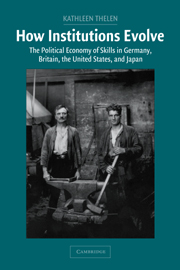 How Institutions Evolve
How Institutions Evolve Published online by Cambridge University Press: 05 September 2012
I am well aware that vocational training is not going to strike some readers as the most scintillating of topics, but I hope they persevere long enough for me to make the case that this subject holds many valuable insights for political economy and comparative politics generally. I myself became interested in skill regimes as an offshoot of my interest in what defines and sustains different models of capitalism. Wolfgang Streeck's pioneering work first drew my attention to the importance of training in Germany's successful manufacturing economy in the 1980s. In the meantime, a broad consensus has emerged that skill formation is a crucial component in the institutional constellations that define distinctive “varieties of capitalism” in the developed democracies and very possibly beyond. This literature has made it very clear that different skill formation regimes have important consequences for a variety of contemporary political economic outcomes, but it had nothing to say about where these institutions had come from in the first place. This is what I wanted to find out.
The cross-national component of this book, therefore, explores the genesis of some striking institutional differences across four countries – Germany, Britain, the United States, and Japan – asking the question: “Why did these countries pursue such different trajectories with respect to skill formation and plant-based training?” My research led me back to the nineteenth century and pointed specifically to differences in the coalitional alignments among three key groups – employers in skill-intensive industries (especially metalworking), traditional artisans, and early trade unions.
To save this book to your Kindle, first ensure [email protected] is added to your Approved Personal Document E-mail List under your Personal Document Settings on the Manage Your Content and Devices page of your Amazon account. Then enter the ‘name’ part of your Kindle email address below. Find out more about saving to your Kindle.
Note you can select to save to either the @free.kindle.com or @kindle.com variations. ‘@free.kindle.com’ emails are free but can only be saved to your device when it is connected to wi-fi. ‘@kindle.com’ emails can be delivered even when you are not connected to wi-fi, but note that service fees apply.
Find out more about the Kindle Personal Document Service.
To save content items to your account, please confirm that you agree to abide by our usage policies. If this is the first time you use this feature, you will be asked to authorise Cambridge Core to connect with your account. Find out more about saving content to Dropbox.
To save content items to your account, please confirm that you agree to abide by our usage policies. If this is the first time you use this feature, you will be asked to authorise Cambridge Core to connect with your account. Find out more about saving content to Google Drive.